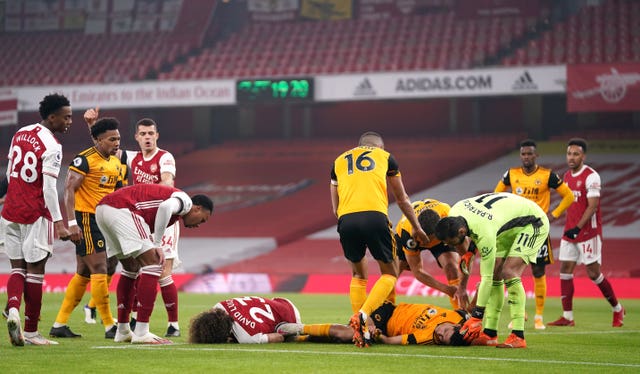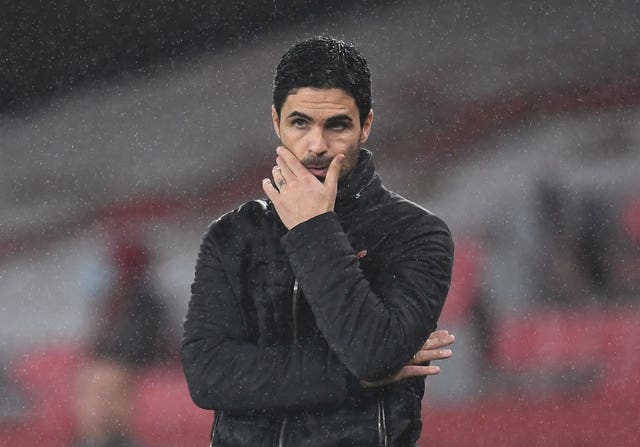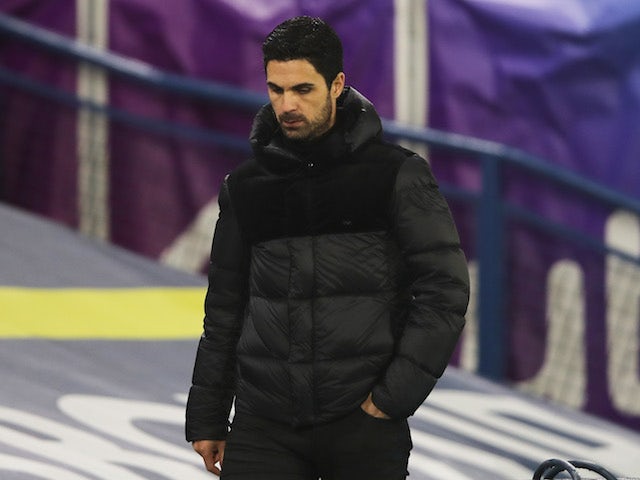Arsenal manager Mikel Arteta has backed calls for concussion substitutes to be introduced in football.
The Gunners boss saw defender David Luiz involved in a sickening clash of heads with Raul Jimenez on Sunday which left the Wolves striker with a fractured skull.
Luiz played on until half-time, with Arsenal insisting all concussion protocols currently in place were followed, but was replaced as blood continued to seep through his bandaged head.
Arsenal faced fierce criticism for not replacing Luiz immediately after the collision, which occurred just five minutes into the Premier League fixture.

The Brazilian has been ruled out of Thursday's Europa League tie against Rapid Vienna but Arteta has said Luiz has a chance to be fit in time for Sunday's north London derby at Tottenham.
"Some people can have the perception whether he should have continued or not," Arteta said when asked about Luiz.
"Thankfully we have one of the leading authorities (on concussion) in this country, which is Gary O'Driscoll, who is our doctor and has massive experience, not only in football but rugby as well.
"He knows exactly what to do. He did all the testing, he followed all the protocols and we were very comfortable for him (Luiz) to carry on playing.
"But obviously you have to make a decision in one minute, when somebody is bleeding, when you have someone with a massive concussion next to you – whose life is under threat."
He continued: "Maybe it is a moment that we can think to give these people a little bit more time and use a temporary substitution, for example, if we don't want to find ourselves in those positions.
"But what I can tell you is everything was done in the right manner and the only aim here is to protect the welfare of the player – that is all.
"If you have any doubts at any moment and you need an extra two minutes or five minutes to check somebody – maybe we can think about that.
"The player wants to carry on playing and the doctor has to tick all the necessary boxes to be certain the player is OK to continue.
"So, if we have any extra doubts, OK we give them a little bit more time than necessary but you cannot play 10-15 minutes with 10 men in football."
Arteta also insisted that accidental clashes cannot be avoided in football and that sometimes they will lead to unfortunate, serious injury.
"Obviously, it's never happened in football," he added on concussion substitutes. "It happens and it's very common in other sports.
"And it's just a suggestion, you know I want to be extra protective, which I think we have to be in certain moments when we really are considering the welfare of the players and have a fair competition while the game is still running.
"There are certain things in this sport that are inevitable. So that clash – how can we avoid that? I think it's almost impossible.

"There are so many unpredictable things that can happen when you have 22 players running in all kinds of directions, fighting for a ball.
"Let's see what happens in the future, but honestly it is difficult to avoid these circumstances. It has happened in the past and we hope that it never happens again but nobody can guarantee that."
One possible solution to tighten up protocols and recognise concussions in players has been mooted by Sports Wellbeing and Analytics (SWA).
The Swansea-based company has developed a mouthguard which contains a chip to measure the force of impact and provide data to establish whether a player has suffered injury.
The technology is already being used in rugby union and boxing and SWA representative David Allen believes all Premier League clubs would benefit from the mouthguard.
"We could send a dentist to a club, have the mouthguards done and be up and running within 10 days," he told the Daily Mail.
"We could put this in a Premier League team with their squads of 25 players for £1million for a full year... that's less than the cost of any one player.
"The reason we use a mouthguard is very important. The only part of the body that does not move independently of the skull is the upper jaw.
"Therefore the impact recorded in the mouthguard is exactly the same as is passing through the skull."








